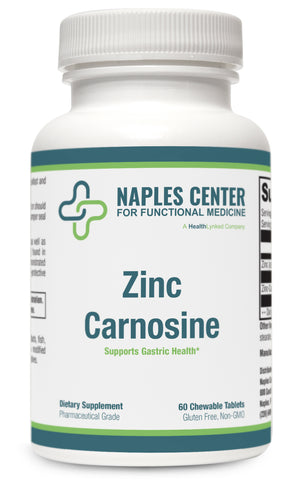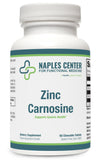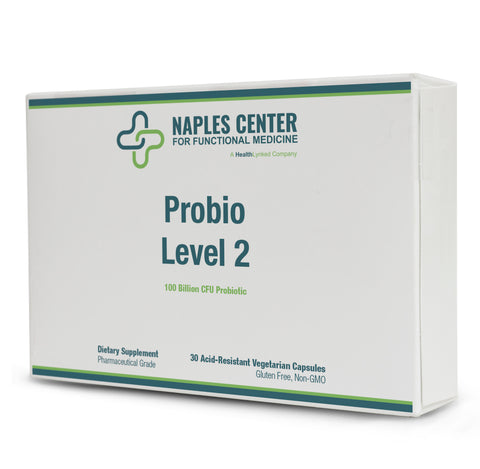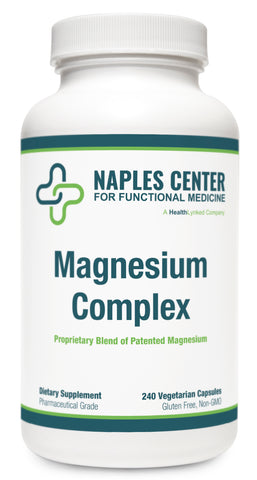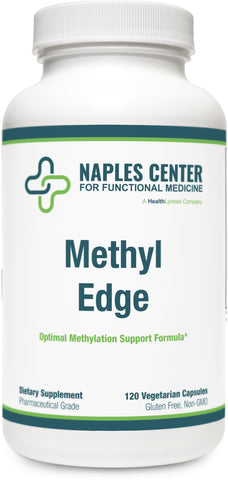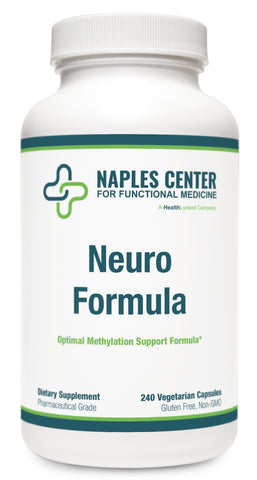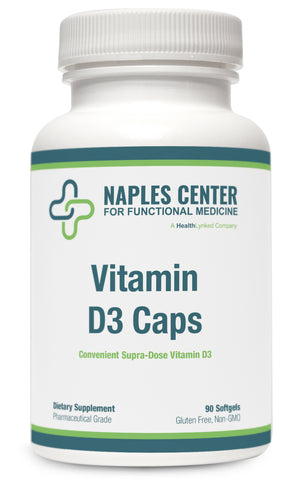Zinc Carnosine
Zinc Carnosine
Supports Gastric Health*
Zinc Carnosine is a zinc-carnosine complex consisting of elemental zinc as well as L-carnosine, a naturally occurring dipeptide (beta-alanine and L-histidine) found in muscle and brain tissue. More than 40 human and animal studies have demonstrated Zinc Carnosine safely and effectively supports the stomach’s own natural cell-protective mechanisms without interfering in the normal digestive process.*
Disclaimer
Directions
Swallow with liquid or chew one tablet immediately after breakfast and one tablet before bedtime, or as directed by your healthcare practitioner.
Does Not Contain
Wheat, gluten, corn protein, yeast, soy, animal or dairy products, fish, shellfish, peanuts, tree nuts, egg, artificial colors, artificial sweeteners, or preservatives.
Storage
Keep closed in a cool, dry place out of reach of children.
Other Ingredients
Isomalt, stearic acid, magnesium stearate, modified cellulose, and silica.
Caution
Consult your healthcare practitioner before use. Keep out of reach of children. Avoid if allergic to any ingredient.
Applications
- Supports the Relief of Occasional Gastric Discomforts (e.g., occasional heartburn/indigestion, upset stomach, belching, burping, bloat, mild nausea)*
- Helps Maintain a Healthy Balance of Gastric Flora*
- Protects and Supports the Integrity of the Gastric Mucosa*
- Provides Antioxidant Activity in the Upper Gastrointestinal Tract*
- Supports Healthy Cytokine Expression in Gastric Cells*
Disclaimer
Discussion
Many factors impact digestion, the stomach’s mucosal lining, and the overall health of the upper gastrointestinal (GI) tract. For various reasons, there may be temporary upset in the balance of flora present in the gastric environment.[1] A wide range of treatments exist for the approximately 25-40% of Americans who suffer from occasional common upper GI discomforts. Whereas an effort is commonly made to either neutralize or block gastric acid, Zinc Carnosine, a zinc L-carnosine complex, supports the stomach’s natural “cytoprotective” defense mechanisms without negatively impacting stomach pH. In human studies, including four- and eight-week clinical trials among 691 subjects, zinc L-carnosine exhibited high efficacy without any serious side effects.*[2]
Carnosine is a naturally occurring dipeptide composed of the amino acids L-histidine and beta-alanine. Carnosine can form stable complexes (ligands) with ion minerals like zinc and copper. Zinc Carnosine contains a unique, proprietary zinc L-carnosine complex that has been in wide use in Japan since 1994. Zinc Carnosine differs chemically and biologically from a simple combination of zinc and L-carnosine and has been shown to be approximately three times more effective than supplementing individually with either zinc sulfate or L-carnosine.*[3]
A healthy gastric mucosal lining protects the upper gastrointestinal tract unless it is overburdened by the damaging effects of stress, bacteria, or irritating substances. Since L-carnosine and zinc each have mucosa-supportive properties, it is not surprising that the zinc L-carnosine ligand significantly protects and has been shown to enhance the integrity of the gastric lining. Thus, a healthy balance of flora may be re-established within the stomach in a relatively short time frame. In addition to its support of mucosa integrity, Zinc Carnosine has been shown, in a study on rats, to enhance cellular resistance to ethanol without affecting endogenous prostaglandins.[4,5] This is highly relevant because prostaglandins are key components of the mucosa. This zinc L-carnosine complex has also been shown to have anti-urease activity, which may indirectly support the gastric mucosa by maintaining a healthy balance of flora in the stomach.*[6]
Zinc L-carnosine complex does not rapidly break down in the stomach because it is a polymer. Japanese researchers found that this prolonged-release complex adheres to areas of the stomach lining and forms a new mixed ligand complex with other body components (perhaps proteins, like albumin) for extra support. At some point, a ligand exchange frees the L-carnosine and zinc from the complex and makes each available to optimize the health of the mucosal lining.[6] In addition to the benefits these nutrients have in the GI tract, L-carnosine has antioxidant activity[7] and zinc participates in the body’s healthy natural response to inflammation.[8] Animal studies have demonstrated that the zinc L-carnosine complex maintains the homeostasis of the gastric mucosa by its antioxidative, membrane-stabilizing capability[6,9] and by protecting gastric cells via promotion of mucous production.[5] The zinc L-carnosine complex also blunts genetic proinflammatory signaling and the release of proinflammatory cytokine expression in the gastric epithelial cells.[10] A 2012 phase III clinical trial in Japan demonstrated a mechanism of action that explains why, in dietary zinc-deficient rats, zinc L-carnosine administration restored the lingual epithelium’s zinc content. Interestingly, it also improved deficiency-induced delayed cell proliferation of taste bud cells.*[11] Zinc Carnosine is a zinc L-carnosine complex that safely and effectively supports the stomach and upper GI tract’s integrity
We Also Recommend

